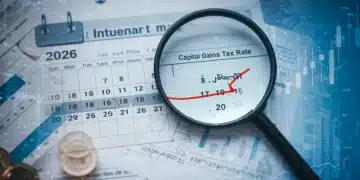Latest political updates on tax reforms in your area

The latest political updates on tax reforms indicate significant changes driven by public opinion and key political figures, with future predictions emphasizing equity and economic impact.
Latest political updates on tax reforms are shaping the landscape of how we understand our economic responsibilities. Curious about how these changes affect you? Let’s dig into the details.
Current tax reform proposals and their impacts
The current tax reform proposals are making headlines, as politicians and policymakers are discussing changes that could impact many taxpayers. Understanding these proposals is essential for staying informed and prepared.
Overview of Proposals
Several key proposals aim to reshape the tax landscape. These changes might affect everyone from individuals to large corporations. Here are some of the main proposals currently under consideration:
- Reduction of corporate tax rates
- Increased tax credits for low-income families
- Changes in capital gains tax regulations
- Adjustments to estate taxes
Each of these proposals has different implications. For instance, lowering the corporate tax rate could encourage businesses to invest more in growth and job creation. At the same time, changes in capital gains tax could directly affect investors and their returns.
Impacts on Taxpayers
How will these proposals impact everyday taxpayers? It varies widely. Lowering taxes for corporations may lead to more job opportunities as businesses expand, while higher tax credits for families can alleviate some financial burdens.
It’s also important to consider how these changes might influence government spending. If tax revenues decrease, funding for public services might be affected. As a result, taxpayers may notice shifts in services they rely on, such as education and healthcare.
Keeping Updated
As discussions continue, staying updated on tax reforms is crucial. Keeping an eye on news reports, government announcements, and expert analyses can provide insight into how these proposals evolve. Engaging with local forums or community discussions can also enhance understanding and help taxpayers voice their concerns.
Key political figures influencing tax policy

Understanding the key political figures influencing tax policy is crucial for grasping the ongoing changes in tax reforms. These individuals play a significant role in shaping legislation that can affect millions of taxpayers.
Major Players in Tax Policy
Several politicians have emerged as leaders in the tax reform debate. Their opinions and actions can steer the direction of tax laws. Here are some notable figures:
- The President, who proposes budget plans and tax reforms.
- The Treasury Secretary, responsible for overseeing economic policy.
- Key senators and representatives who serve on financial committees.
- State governors advocating for local tax reforms.
These individuals often have different priorities, which can lead to varied discussions and negotiations. Their positions can greatly impact new proposals and how they are received by the public.
The Role of Advocacy Groups
In addition to political figures, advocacy groups also have considerable influence. These organizations lobby for specific tax policies that benefit particular sectors of society. They often provide research, gather public support, and engage in outreach efforts.
Moreover, political campaigns frequently highlight tax issues, making these figures even more prominent in the public eye. The public’s perception of these leaders can shape how tax reforms are viewed, influencing future proposals and amendments.
How They Impact Policy Changes
It is essential to understand that each political figure brings a unique perspective to tax policy. For instance, some may focus on simplifying the tax code, while others might emphasize increasing revenues.
This diversity can lead to negotiations and compromises that ultimately shape the laws governing taxes. By closely following their actions and statements, taxpayers can better understand potential impacts on their financial responsibilities.
Public opinion on recent tax changes
Understanding public opinion on recent tax changes is essential to see how these reforms may affect society. People have diverse views on tax policies, and these perspectives can significantly influence future legislation.
Survey Insights
Recent surveys show varying attitudes towards the latest tax reforms. Many individuals express concerns about potential increases in their tax burden. On the flip side, others believe that tax breaks for businesses can lead to job growth and economic improvement.
- Approximately 60% of people worry about rising taxes.
- Only 30% support corporate tax cuts, fearing they may benefit the wealthy primarily.
- A significant number favor increased tax credits for low- and middle-income families.
- Public sentiment often divides along party lines.
These statistics indicate a complex relationship between taxpayers and proposed reforms. The understanding of public opinion can guide how lawmakers approach tax legislation.
The Role of Media
The media plays a significant role in shaping public views on tax changes. Reporters highlight both the advantages and disadvantages of new policies, often swaying public sentiment. Social media platforms also amplify these discussions, allowing individuals to express their thoughts and engage in debates.
As reactions unfold on social media, people share personal stories that can resonate with larger audiences. This feedback loop can compel politicians to either embrace or revise tax proposals based on public reaction.
Future Implications
As tax changes continue to develop, understanding what the public thinks will be key. Lawmakers are likely to consider these opinions when crafting or revising policies. Engaging with constituents through town halls and forums enables them to gauge sentiments and address questions directly.
As feedback shapes future decisions, constituents should remain informed and involved. By participating in discussions about tax policies, individuals can impact what happens next in the political landscape.
Future predictions for tax reforms

Looking ahead, the future predictions for tax reforms reveal various potential directions for tax policy. These predictions are shaped by current discussions, economic trends, and political pressures.
Potential Changes on the Horizon
Experts suggest that several key areas of tax policy might evolve in the coming years. Anticipated shifts include:
- Increased emphasis on tax equity and fairness.
- Greater scrutiny on corporate tax loopholes.
- Potential adjustments to capital gains and income tax rates.
- Expansion of tax credits aimed at supporting lower-income households.
These possible changes reflect ongoing efforts to create a more equitable tax system. As income inequality continues to rise, many policymakers advocate for reforms that will help balance the scales.
The Influence of Economic Trends
The economy plays a crucial role in shaping tax reforms. Economic growth or decline can dictate how much revenue the government collects and how it is allocated. If the economy continues to recover, there may be more room for expanding tax credits and funding essential services.
Conversely, economic downturns might force lawmakers to reassess spending and prioritize fiscal responsibility, potentially leading to increased taxes to cover shortfalls. The evolving global economy can also impact domestic tax policies as countries compete for investments.
Political Climate and Tax Reforms
The political landscape is another key factor affecting future tax reforms. Shifts in party control can lead to significant changes in tax legislation. If a party focused on tax cuts gains power, we may see reductions in tax rates or caps on certain deductions.
Alternatively, if voters elect representatives who prioritize social programs, new tax measures could focus on increasing funding through higher rates for the wealthy. These dynamics will continuously shape the discussion around tax reforms.
FAQ – Frequently Asked Questions about Tax Reforms
What are the main factors influencing tax reforms?
Key factors include political climate, public opinion, and economic conditions that shape how tax policies are proposed and implemented.
How can I stay informed about tax changes that affect me?
You can follow news outlets, government announcements, and engage in community forums to keep up with tax reforms and their impacts.
What role do advocacy groups play in tax policy?
Advocacy groups lobby for specific tax reforms, representing the interests of different sectors and influencing public opinion on tax issues.
How can I engage in discussions about tax reforms?
You can participate in town halls, reach out to your elected representatives, and share your views in local forums to influence tax policy.





